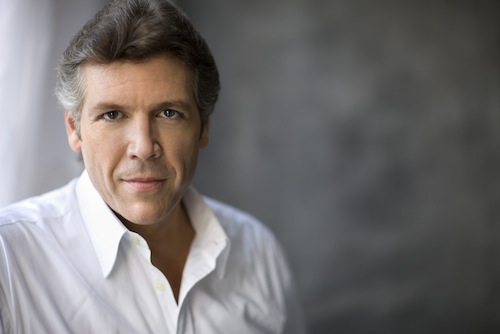Hampson brings insight to a program of (mostly) American song at Four Arts

Thomas Hampson performed a program centered on American song Wednesday night at the Society of Four Arts in Palm Beach. Photo: Dario Acosta
For more than three decades, Thomas Hampson has been a major presence on the world’s opera and concert stages. From early success in Mozart roles to forays into Verdi, Wagner and, recently, French opera, the American baritone has always brought vocal artistry and keen musical intelligence to his wide repertoire.
No less important has been his dedication to lieder and art song. Hampson’s championing of the neglected vignettes of American composers has been particularly significant. In an unusually interesting recital on Wednesday night at the Society of Four Arts in Palm Beach, Hampson offered a musical tasting menu of the many strands that form the classical songbook.
Opening with five songs by Richard Strauss, the baritone concentrated on the road less traveled rather than the most programmed Strauss lieder. Hampson initially sounded somewhat gravelly in “Heimliche Aufforderung” but his subtle play of vocal dynamics enlivened this invitation to a clandestine meeting of lovers wrapped in a toast of celebration. (Strauss wrote the song as a celebration of his wedding to soprano Pauline de Ahna.) Fully warmed up, he evoked the aura of romance beneath “Freundliche Vision,” the high pianissimos beautifully controlled.
“Mein Herz ist stumm, mein Herz ist kalt” was almost a recitation, Hampson carefully weighing the conflicting emotions of Adolf von Schack’s text. “Sehnsucht” was a full voiced paean to memories of love lost and Hampson imbued “Ruhe, meine Seele” with deep, almost bass like tones, finely registering a man’s request for inner piece. More than a mere accompanist, pianist Wolfram Rieger was a full collaborator, playing superbly and matching Hampson’s every nuance without ever calling undue attention to his patrician artistry.
Instead of the originally scheduled songs by Samuel Barber, Hampson reprised the new song cycle Civil Words by Jennifer Higdon which he premiered at Carnegie Hall Monday night. The Pulitzer Prize winning Higdon is best known for her instrumental works but she is working on an opera based on Charles Frazier’s novel Cold Mountain and, if her Civil War cycle is a preview, Higdon seems to have a natural affinity for texts.
Setting the words of soldiers and parents, President Lincoln’s final public speech and a minister’s eulogy for the fallen leader, Higdon’s music has a simplicity and almost folklike sense of American vernacular styles, like parlor song meeting art song. The jagged march rhythms of “Night Watch” portend the tragedy of death, turning quiet as the waters of the Potomac flow ever forward. A death motif rings out as the pianist keeps one hand on the instrument’s strings for William Cullen Bryant’s tribute to Lincoln, the music rising to an ecstatic cry over the war’s larger sense of loss. In “Driving Home,” the final song, the pastoral text contrasts the beauty of the now peaceful landscape with the carnage that took place upon it, the music somber and elegiac. Higdon’s fine vocal writing and thoughtful choice of texts mark her work as a valuable addition to the American song repertoire and portend well for her opera, scheduled to premiere at Santa Fe Opera in August. Hampson’s superb vocal acting and clear enunciation contributed to the work’s strong impression.
For the second half of his program, Hampson assayed highlights from his “Songs of America” tours and recordings. Starting with “My Days Have Been So Wondrous Free,” a salon ditty by Francis Hopkinson, a signer of the Declaration of Independence, designer of the American flag and early federal judge, Hampson sang classic Ives and Copland songs as well as some intriguing rarities. Arthur Farwell was an American original, deeply immersed in the music and rhythms of Native Americans. Hampson’s virile baritone took full cry in the warrior’s opening war call but he brought depth of tone and pathos to the ensuing death song, the dramatic piano chords turning soft and tragic.
The haunting melody of Michael Daugherty’s “Letter to Mrs. Bixby” brings brings typically lyrical outpouring for Lincoln’s troubled letter of condolence to a mother whose son has fallen in battle. In Margaret Bonds’ “The Negro Sings of Rivers,” a rising vocal line recalls classic spirituals. The song’s remarkably beautiful poetry is the work of the nineteen-year-old Langston Hughes. “Shenandoah” was vintage Hampson, the tones warm and lustrous. He has long been a master interpreter of Copland’s Old American Songs and captured the wit and irony of “The Dodger” and the swinging rhythm of “The Boatman’s Dance.”
There were many empty seats for this intimate recital by such a distinguished artist and the assembled audience only awarded Hampson and Rieger one curtain call. Vocal lovers will have another chance to catch Hampson in the American repertoire he champions on Sunday at New World Center in Miami Beach.
Posted in Performances
Leave a Comment
Thu Feb 12, 2015
at 12:48 pm
No Comments